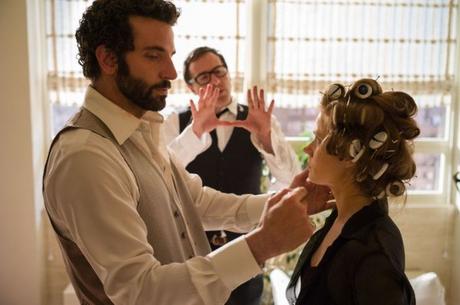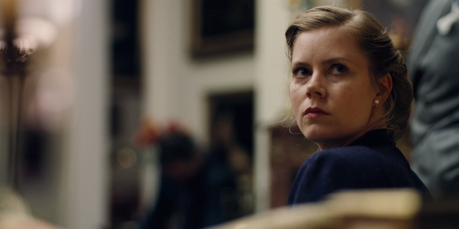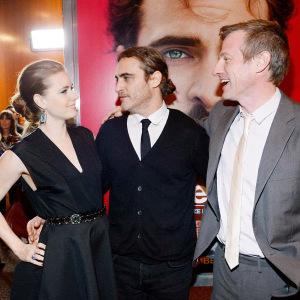Steven Spielberg. Mike Nichols. Norah Ephron. David O. Russell. Paul Thomas Anderson. Clint Eastwood. Spike Jonze. Tim Burton.
Those are among the biggest directors of our time, and Amy Adams has worked with all of them, from Spielberg’s Catch Me if You Can in 2002 to Burton’s Big Eyes in 2014. She has 5 Oscar nominations to show for it, and similar to Jennifer Lawrence she’s currently on a roll where whenever she does a David O. Russell movie it results in an Oscar nomination, going two for two so far with The Fighter and American Hustle. However, while recently taking part in the Hollywood Masters interview series at Loyola Marymount University’s School of Film & TV in Los Angeles she opened up about a great many things, including why her need for a better work/home life balance might give her pause if Russell offers her another part in one of his movies.
The notoriously strict director has improved his image after rather public and very embarrassing spats with the actors on his early movies like Three Kings and I Heart Huckabees. After The Fighter, Silver Linings Playbook and American Hustle, he’s become that guy who’s very demanding but will push you to career heights as opposed to the guy you’d never consider working for. That’s why Bradley Cooper, Jennifer Lawrence and Robert De Niro keep working with him, the Silver Linings Playbook/American Hustle co-stars all re-uniting in Russell’s new movie, Joy (due at Christmas). However, as Adams candidly admits sometimes an actor has other things to consider, such as not wanting to bring such intensity into their lives when they have a young child at home (Adams’ daughter, her only child to this point, was born in 2010).
On the flipside, she praises Paul Thomas Anderson and Spike Jonez for the set environments they create, which is funny because Anderson, much like Russell, famously had an actor come close to punching him on the set of one of his early movies (Boogie Nights). However, it’s not all about good vibes for her. She’s also very interested in how exactly different directors approach their actors and whether or not that’s a good fit for her, personally. Someone like Russell might bludgeon her into submission and her performance will be the better for it whereas Anderson might actually trick her into getting out of her own head.
Here are the pertinent quotes from the long interview, which was moderated by THR’s Stephen Galloway:
David O. Russell

Cooper, Russel & Adams on the set of American Hustle
After Russell challenged Adams to play a tough-as-nails bartender in The Fighter and demanded that she watch The Real Housewives of New Jersey for research, she was more than happy to work with him again on his next movie, American Hustle. In fact, it more or less went that he mentioned he was doing a new movie and asked if she wanted to be in it and she said yes. She plays Christian Bale’s mistress and co-conspirator in a con operation they have running before the FBI, led by Bradley Cooper’s character, busts them and forces them to help set up a sting operation to go after even bigger fish.
ADAMS: American Hustle, I’ve said before, was the hardest thing I’ve ever worked on. I can’t state why. I just think I was really, really raw and David was really, really demanding. And the combination of the two things weighed on me heavily, even in that scene [where Amy’s character, who’s masquerading as an English lady, reveals to Bradley Cooper that she’s not who she seems.] It was much longer, and David demands it to be real: “Hit him!” And Bradley’s like, “Hit me!” And I’m like, “Oh, I don’t want to hit you.” [LAUGHTER] There’s a part before I smash him with the [plate], where I actually slapped him, and they cut that. That’s why I never really watched it again, ’cause I was like, “I don’t want to watch that.” And then after the scene was done, I was crying: “I didn’t want to hit Bradley and it shouldn’t be like this.” I know, I’m a little nutty. Nutty noodle. [LAUGHTER] It was a tough shoot, let’s just put it that way. David was extremely demanding. He wasn’t the same on The Fighter, for me, anyway. But, having a daughter, I just didn’t want to go home like that. I couldn’t. I didn’t want to do that anymore. I’ve never really talked about that before. And David does do such great work. It was just a difficult one.
Paul Thomas Anderson
 In The Master, Philip Seymour Hoffman more or less plays L. Ron Hubbard, and the film is about the rise of Scientology in the 1950s. For legal reasons, though, it just can’t actually call him Hubbard or his movement Scientology. Adams plays Huffman’s follower-turned-devoted-wife, and in one stunning sequence we see who truly has the power in the relationship after Hoffman takes things too far by turning a group gathering that turns into something of an orgy. Adams makes sure he’ll never piss her off like that again.
In The Master, Philip Seymour Hoffman more or less plays L. Ron Hubbard, and the film is about the rise of Scientology in the 1950s. For legal reasons, though, it just can’t actually call him Hubbard or his movement Scientology. Adams plays Huffman’s follower-turned-devoted-wife, and in one stunning sequence we see who truly has the power in the relationship after Hoffman takes things too far by turning a group gathering that turns into something of an orgy. Adams makes sure he’ll never piss her off like that again.
ADAMS: Paul Thomas Anderson has a really great sense of humor and [for] anyone who gets to meet or work with Paul Thomas Anderson, he’s so awesome. It’s nice to be able to have really wonderful, beautiful memories of that relationship.
GALLOWAY: What makes him awesome as a director? From an actor’s point of view, what is an awesome director?
ADAMS: Each director is different. David and his demands make him an awesome director, and his immediacy. And Paul — what I imagine he was doing was tricking me, and I didn’t know it. He would figure out how to get each actor to do what they needed to do without [saying, “This is what you’re going to do.” So we did a scene where I was yelling at Philip about a party that had gone poorly, and for two weeks leading up to it Paul was saying, “I want this to be huge. This is your scene. I want you to tear up the scenery. Feel free. Just chew it up.” So we get in there, and I put all this pressure on myself, and I get in and we start. And I’m going around and packing up and all of this. He’s like, “I don’t know. I just don’t see it like that.” “OK. What should we be doing?” “Can you just stand still?” “OK.” “And can you turn around?” And I’m like, “You want my back to the camera?” “And just sit on the edge of the bed” — which was probably how he was intending on doing it the whole time.
GALLOWAY: Oh, right. [LAUGHTER]
ADAMS: But now what he’s done: he’s got me to prepare the scene to fill up an entire room, and now he’s asked me not to move and to turn my back to the camera. And in the moment, I was not smart enough [LAUGHS] to realize that this is what was happening. Then he gave me a second half of the monolog to do. So instead of just running lines, I was actually learning new ones. And I realize now, what he was doing is he was getting me out of my head. He could tell I’m someone who gets really in my head. And he got me out of my head. It was kind of a trick, and it worked. And it wasn’t until months later that I was like, [GASPS] he’s so sneaky! [LAUGHTER] But it worked, because I felt really free. But I also felt super-contained, like I was going to explode, because he had prepped me to do a scene that would fill up an entire room, then asked me to sit down and not move.
And in that moment her character needed to seem like someone barely containing an anger we didn’t know she had, liable to explode at any given moment if her husband makes the wrong move. It’s fascinating to hear that Anderson tricked Adams into pulling it off.
Spike Jonze

Adams with Joaquin Phoenix & Spike Jonze on the red carpet for Her
At the end of the interview, one of the Loyola Marymount University students asked Adams whether there were any directors she’s dying to work with, and she referenced how much she enjoyed working with Spike Jonze on Her:
Sure. The list, of course, that is vast, goes out of my mind as soon as you talk about it. I think it’s different, because I can like their work, but I’ve walked away from directors I’ve wanted to work for forever, because I couldn’t connect with the role. And that’s been really hard, because there’s been people — and I won’t say them — but that I’ve really wanted to work with, and I just knew that I was not going to be a success. I knew that it wasn’t going to be a good fit. I think at this point in my life what I look for is a little different than what I used to. Because I used to be really hungry to be the best that I can be, and I still want to be the best that I can be. But I want good set experiences. I want people who can be leaders and be challenging — like Spike Jonze: man, he is challenging, but he does it in a way that’s like, I can go home to my daughter and feel like a successful parent. You know what I mean? I want a director that respects a balance. That’s what I look for now, which I know isn’t sexy for students. So, go out there and be hungry and challenge yourself. But right now I’m looking for somebody who really respects the balance that I’m looking to create in my life.
This all adds up to a fascinating peek into Amy Adams’ current state of mind, but from a larger standpoint it’s also a reminder of the practical considerations certain actors must ponder before taking a role. It’s also a very interesting insight into the acting process and a reminder that a director is responsible for so much more than simply sitting in their chair and yelling, “Action!”
Source: THR

